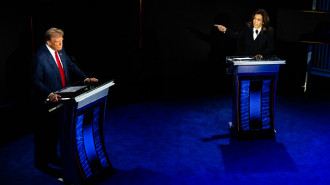Airstrikes target Yemen capital as crisis enters new phase
Loud explosions rocked the Yemeni capital Sanaa until the early hours of Wednesday as warplanes struck arms depots for a second straight night, residents said.
"Sanaa witnessed during the night the most violent raids since the start of the bombing" by coalition warplanes across Yemen on March 26, said Saleh Moqbel, a resident of the capital's Old City.
The raids come after a five-day humanitarian truce expired late on Sunday.
The air raids came hours after a conference on Yemen concluded in the Saudi capital, Riyadh.
Meanwhile, UN World Food Programme (WFP) warned that the ceasefire was not long enough for food and relief supplies to reach those in need, calling for more "predictable pauses" so that the almost 750,000 people WFP hopes to help can be reached.
The conference in Riyadh hosted most Yemeni political figures opposed to the Houthis and Saleh, the vast majority of whom are wanted by the Houthi authorities in Sanaa.
As expected, the declaration delivered at the end of the conference reflected the position of Hadi and his government, led by vice-president and prime minister Khalid Bahah, all exiled in Riyadh. The outcomes of the conference are their way of setting out their stall before any future UN negotiation, and reflect the current insistence that a military defeat must be inflicted on the Houthis and Saleh, despite the difficulty allied fighters and coalition airstrikes have had in pushing the Houthi-Saleh forces back.
Going forward, the UN is expected to play a key role in bringing about an end to the conflict. The UN, now with a new envoy to Yemen, the Mauritanian Ismail Ould Cheikh Ahmed, continues to put its efforts towards making a push for a conference involving all sides in Geneva. The Houthis refused to attend the Riyadh Conference.
In addition to the declaration, the conference also issued a communique containing non-binding political recommendations that were not all adopted in the binding declaration. One such recommendation was a call for the UN, the Arab League and the Gulf Cooperation Council to form a joint Arab military force to secure Yemen's main cities and oversee the implementation of UN Security Council resolutions, ensure that Houthi-Saleh forces withdraw and handover weapons.
Military option
The focus on confronting the Houthi-Saleh forces militarily was possibly the most important issue emphasised by the declaration. The declaration said that all military and political tools would be used to end the rebellion and to restore the seized state institutions and arms. The declaration also pledged to start rebuilding the security forces “to guarantee security and stability in accordance with the outcomes of the National Dialogue”.
The document also pledged support for “official and popular resistance led by the legitimate leadership in all areas where there are coup and rebellion militias”, referring to local resistance units across the southern, central and eastern parts of the country fighting the Houthis & Saleh.
Interestingly, the declaration stressed the need to quickly establish a “safe zone” inside Yemen to serve as the “base for the resumption of the functions of the legitimate state institutions”.
The South
The declaration attempted to tackle the problematic southern question, but some southern political figures have said that the Riyadh Conference did not meet the hopes of the southern street, particularly in relation to restoring the former state of South Yemen and secession.
However, the figures did say that the declaration delivered at the end of the conference was endorsed by a broader and more representative segment of Yemenis that the National Dialogue Conference in Sanaa that took place in 2013, and which many southern separatist factions did not attend.
In addition to the stated priority of defeating the Houthis and Saleh, the southern question was declared the second-most important priority, although this was linked to clauses relating to the transition of Yemen to a federal state, something that some separatist factions say does not go far enough.
![Palestinians mourned the victims of an Israeli strike on Deir al-Balah [Getty]](/sites/default/files/styles/image_684x385/public/2024-11/GettyImages-2182362043.jpg?h=199d8c1f&itok=xSHZFbmc)


![The law could be enforced against teachers without prior notice [Getty]](/sites/default/files/styles/image_684x385/public/2178740715.jpeg?h=a5f2f23a&itok=hnqrCS4x)
 Follow the Middle East's top stories in English at The New Arab on Google News
Follow the Middle East's top stories in English at The New Arab on Google News

![Voters in Michigan [Getty]](/sites/default/files/styles/image_330x185/public/2182490468.jpeg?h=a5f2f23a&itok=XMi_sWGX)
